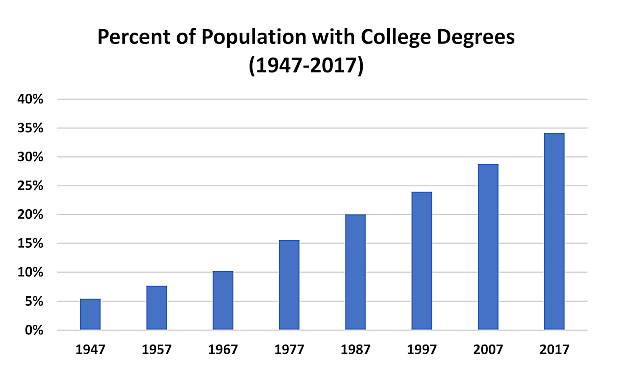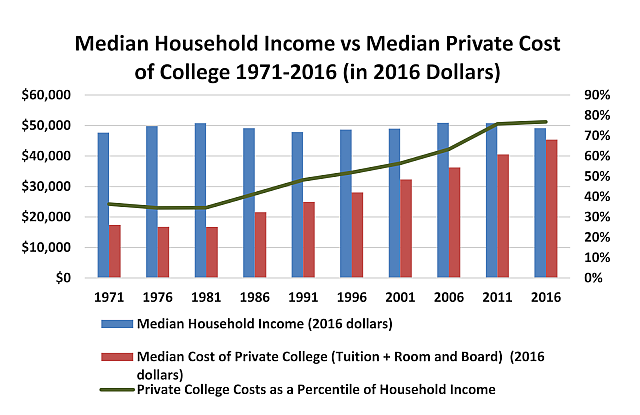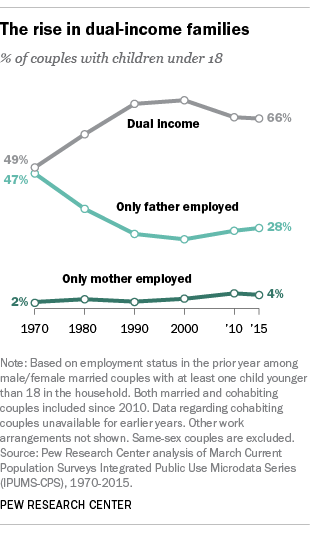(This is Part 2 of a multi-part series that will look at the proliferation of college graduates that started to emerge in the 20th century, the soaring costs of education, and how that dynamic is a key contributor to the rising social inequality we see today. In later parts of this series we’ll look at what needs to be fixed in the college education system so that colleges are rewarding merit and not privilege and adding value to incoming college freshman instead of merely amassing wealthy constituents at expensive country clubs)
Part 1:
http://samosacaucus.com/2019/04/improvingcollegeeducationpart1/
Part 2:
http://samosacaucus.com/2019/05/improvingcollegeeducationpart2/
History of Modern College Education
Getting a college education did not always used to be like this. In 1947 the percent of the population that was college educated was 5.45%. By 2017 this was 34.15%.1
So why was a college education less important to Americans in 1947 than it is today? The answer starts with the GI Bill.

Prior to 1944, a college education was reserved for the wealthy elites and pure academics of our society. But fearing the possibility of millions of U.S. veterans who risked their lives abroad in World War II only to return home to a jobless future, President Franklin Roosevelt signed the GI Bill which allowed veterans to attend college subsidized by the U.S. government. The strategy worked. Faced with either unemployment or the opportunity to go to college, millions of U.S. veterans enrolled in higher education. By 1947, veterans accounted for 49% of all college admissions. When the original GI Bill ended on July 25, 1956, 7.8 million of the 16 million World War II veterans had participated in an educational or training program sponsored by the bill.2
The timing of government subsidization of a college education coincided with a post-World War II economic expansion in the 1950s and 1960s that saw GDP growth that averaged 4% a year in the 1950s and 5% a year in the 1960s.3
While the reasons behind this economic expansion have been attributed to both improvements in productivity and infrastructure, the end result is that employers changed their views from wanting unskilled labor that they could hire at low wages to do repetitive tasks in factory-like settings, to highly skilled labor that could think critically, innovate, and create better products and services. And where better to find skilled labor that were trained to think critically than on a college campus?
As such, more companies began demanding that their employees have college degrees. So while having a college degree was optional in the 1940s to 1950s in order to have a decent paying non-physical labor job, in today’s environment a college degree is mandatory to have those same opportunities. Furthermore, the difference between the end of the ”Golden Age of Capitalism,” as the post World War II economic boom is known by, and now is that the cost of college has significantly increased in relation to real median household income.
In other words, today’s generation is paying a larger amount of their potential future earnings just to have a college degree and be no wealthier today than their parents were in 1971. And what’s worse is that households that used to require only one income earner in 1971 now require two income-earners to support the household. So today’s American households are paying twice as much as their parents to go to college just to earn the right to work more hours and have the same real income that their parents had more than 45 years ago.


So why has the cost of college skyrocketed while real median incomes have stagnated? If college really improves the quality of an employee, shouldn’t real median incomes have increased as the population became more college-educated?
In this series on college education we’ll look at how college has been transformed from a public enterprise meant to improve the skillset and critical thinking abilities of its population into a capitalistic business enterprise that brings in more than $500 billion revenue while churning out college graduates who excel at taking tests, but not at critical thinking. In a vicious cycle, the lack of critical thinking amongst college graduates has forced employers to devalue the attainment of a college degree.
So instead of looking at college graduates as the problem solvers of tomorrow, employers view them as replaceable low-skilled labor and both treat and pay them as such. For an employer, a college degree no longer means that an employee has the ability to outperform other candidates—it merely means that the employee had the discipline to follow societal rules and do what they were told to—namely to get a college degree. Such attributes make college graduates great at following orders but not at fundamentally innovating the way an existing company operates. 70 years ago our society wanted critical thinkers who could innovate the way America does business and get away from the factory-worker mentality. Now we’ve gone back to a society that wants workers that are essentially factory workers who do what they’re told, don’t ask questions, and don’t challenge authority. The only difference is that today’s generation of factory workers are really good with computers as opposed to those of 70 years ago.
Furthermore, as college admission has gotten both more competitive and more expensive the entire college experience has been geared towards the upper echelon of society who can afford to pay the increasing costs. The college experience for the elite of society is fundamentally different for those of lower socio-economic statuses. The opportunities available to those college graduates from lower socio-economic statuses is not the same as those of their wealthier counterparts either. So while college used to allow upward mobility, the high costs of attendance and limited value-add it provides means that is now a barrier-to-entry to a middle class lifestyle that only the rich can afford in the first place. We’ll conclude this series by looking at the steps that need to fundamentally change in both the college education process in order to add economic value to their incoming students and for employers to foster an environment that values critical thinking and the development of a more productive society.
References:
1. U.S. Census Bureau. “Historical Time Series Tables, Educational Attainment-Table A2”
2. US Department of Veterans Affairs. Available at: https://www.benefits.va.gov/gibill/history.asp
3. US Bureau of Economic Analysis. Available at: https://www.multpl.com/us-gdp-growth-rate/table/by-year


 hbcu.freshu.io
hbcu.freshu.io 
